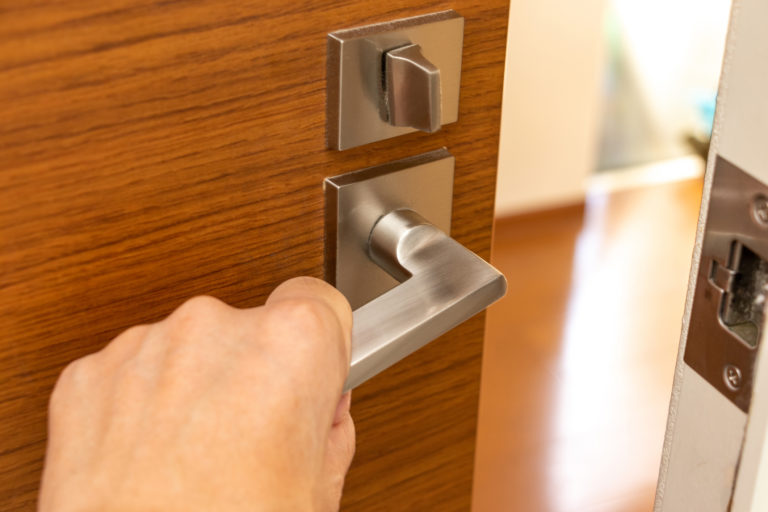Harsh winter conditions can make locks freeze, stick, or stop working altogether, leaving you with frustrating and potentially costly problems. Taking steps to protect your locks from the cold can save you time and trouble. With the right precautions, you can ensure your locks stay functional and secure no matter how cold it gets. Here’s how to weatherproof your locks for winter.
The Science Behind Frozen Locks
Locks freeze when moisture gets inside the mechanism and turns to ice in cold weather. Rain, snow, or condensation can lead to this problem, making the internal components stiff and difficult to operate. Adding to the issue, dirt and debris can combine with the moisture, clogging the lock further. Understanding these causes is essential to prevent frozen locks.
Choosing a Lubricant That Prevents Freezing
One of the easiest ways to winterize your locks is by using the correct lubricant. Products like graphite powder and silicone-based sprays are excellent for cold weather, as they resist freezing while reducing friction and repelling moisture. Avoid oil-based lubricants like WD-40, which may thicken in the cold and attract grime.
Application Instructions:
Insert the nozzle or straw into the keyhole.
Spray or puff a small amount into the lock mechanism.
Insert the key, turning it multiple times to spread the lubricant.
Clean off any excess lubricant from the lock’s exterior.
Routine lubrication, especially before cold weather hits, ensures your locks stay functional and frost-free.
Moisture-Proofing Tips for Your Locks
Moisture management is key to avoiding frozen locks. Use these methods to safeguard your locks:
Install a Weatherproof Cover: A lock cover shields the lock from direct exposure to rain, snow, and ice, reducing the chance of freezing. These are easy to find at hardware stores.
Seal Gaps Around Locks: Prevent moisture by sealing any gaps around locks and door frames with weatherstripping or caulk. This is especially important for locks exposed to the elements.
Use a Lock De-icer Spray: Lock de-icers can quickly melt ice and remove moisture, making them a handy emergency solution. Use sparingly and rely on preventive methods when possible.
Keep Spare Keys Safe: Store Them Inside
Leaving spare keys outside in the winter exposes them to freezing temperatures and moisture, which can cause them to freeze or weaken. To prevent this, store spare keys indoors in a warm and dry spot. If an outdoor spare key is necessary, choose a weatherproof lockbox for added protection against the cold.
Outdoor Lock Protection: Use Covers to Prevent Freezing
Locks on outdoor structures like gates, sheds, or garages are highly vulnerable to freezing conditions. To shield them from snow and ice, use a plastic bag, sock, or rubber cap to cover the lock. Secure the covering with a rubber band for added stability. This simple precaution can prevent freezing and keep the lock functional.
Winter Maintenance: Keep Your Locks Clean
Dirt and debris inside locks increase the likelihood of freezing in cold weather. Regular cleaning helps maintain their functionality. Here’s how to clean your locks:
Use a cotton swab or pipe cleaner to remove surface dirt from the keyhole.
Spray compressed air into the lock to clear internal debris.
Apply lubricant to ensure smooth operation.
Clean and well-maintained locks are less prone to freezing, making this a key part of weatherproofing.
Avoid Hot Water: Better Ways to Thaw Frozen Locks
If your lock freezes, avoid pouring hot water on it. While this may thaw the ice temporarily, it can refreeze quickly in cold weather, potentially worsening the problem. Instead, use a lock de-icer, apply lubricant, or gently warm the lock with a hairdryer on a low heat setting to melt the ice safely.
How to Check Your Locks for Winter Functionality
Even with winter precautions, testing your locks regularly is vital. Insert your key and turn it to confirm the lock’s functionality. If you detect stiffness or resistance, address it immediately to prevent bigger problems.
Replace Rusty or Damaged Locks for Cold Seasons
Locks with wear and tear are prone to freezing and malfunctioning during winter. Replace rusty or hard-to-turn locks with modern, weather-resistant options. All-weather locks are specifically designed to endure extreme temperatures and resist the effects of moisture.
How Lock Socks Help Prevent Freezing in Winter
For outdoor locks you use often, a lock sock or insulated lock protector can provide excellent protection. These weather-resistant covers insulate locks from freezing temperatures, making them ideal for padlocks on gates, garages, and sheds. Simple yet effective, they significantly reduce the risk of frozen locks.
Keep Deadbolt Locks Safe from Snow and Ice with Covers
If your deadbolt lock is exposed to harsh weather, consider installing a deadbolt cover. These covers protect the lock from wind, snow, and ice, significantly reducing the chances of freezing. They’re easy to install and widely available at hardware stores, offering a convenient way to winterproof your locks.
Essential Tools for Handling Frozen Locks: A De-icing Kit
Even the best precautions can’t completely eliminate the risk of frozen locks. Prepare yourself by keeping a de-icing kit in your car or home. Include a lock de-icer spray, compressed air, and a lightweight hand warmer to tackle frozen locks quickly and effectively.
Say Goodbye to Frozen Keys with Digital or Smart Locks
If winter conditions are particularly harsh where you live, investing in smart or digital locks could be worth it. These locks eliminate key freezing or breakage by removing the need for physical keys. Some models even come with weatherproof features, making them ideal for extreme climates. Though they come with a higher price tag, the peace of mind is invaluable.
Prevent Freezing with Routine Lock Maintenance
Locks, like any mechanical device, require regular maintenance to stay functional. At the beginning and end of the cold season, inspect your locks for rust, wear, or damage. Clean and lubricate them as necessary, and replace any that show significant deterioration. Regular upkeep helps ensure your locks work smoothly all year round.
Preparing your locks for winter is key to avoiding freezing problems. By using the right lubricants, keeping moisture at bay, and regularly maintaining your locks, you can ensure smooth operation throughout the cold months. If freezing does occur, avoid forceful methods or hot water, and opt for safer solutions like de-icers or gentle heating.
Even during the coldest winters, regular maintenance and thoughtful preparation can keep your locks performing reliably. Investing in weatherproof upgrades and maintaining your locks properly not only extends their lifespan but also ensures you’re ready to face any seasonal challenges with confidence.

